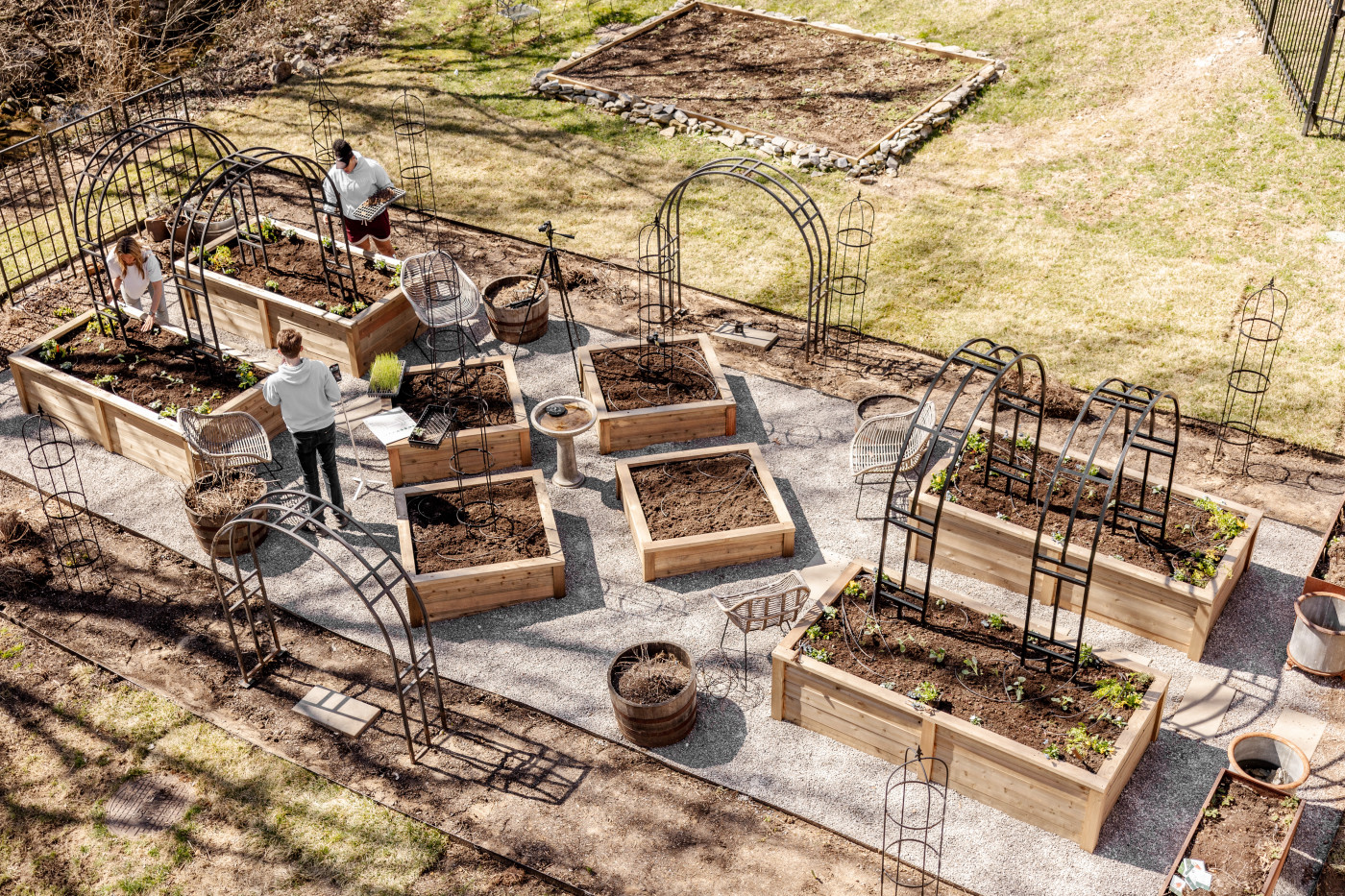What's all the rage about raised gardens?
Pictures of raised gardens may be taking over your Pinterest feed, but are they really that great or even necessary?
I definitely think so. In fact, I'm so convinced raised gardens ensure your vegetable garden success when growing herbs, vegetable, and some fruiting plants that we work exclusively with raised gardens in all of our kitchen garden designs.
Read on to discover five reasons why I'm so committed to gardening with raised gardens and why you'll find more success as both a beginner gardener and an experienced gardener when you set up your garden with raised garden beds.
Shop Our Cedar Raised Beds
Gardenary's new line of quality cedar garden beds are easy to assemble and will provide years of gardening enjoyment. Choose from numerous different garden sizes to fit your space.
Reason one to grow in a raised bed
Gardening in raised beds is simpler
Raised garden beds make gardening so much simpler. The elevated garden setup allows you to start your soil completely from scratch (which means you can make it awesome) and also makes tending the garden much more enjoyable.
When you say "hello" to a raised garden, you say "bye bye" to bending over, kneeling in dirt, and stepping across rows of mud.
The key to success with your vegetable garden is you being in your garden as often as possible. But you'll be much less likely to head out to the garden when it's muddy, difficult to access, or just uncomfortable to tend.
A raised bed fixes those challenges and makes tending your garden easier, more comfortable, and more inviting, which means you'll be more likely to head out to the garden more often... the one thing that needs to happen for your vegetable garden success.


Reason two to grow in a raised bed
Raised garden beds give roots plenty of room
When planting vegetable, herb, and fruit plants directly in the ground, plant roots and vines spread out wide, which means you'll have to give your plants more space.
But in a raised garden, the roots can grow down, way down, and this means you can plant more in a smaller space. I call this "intensive planting" (it's intense!), and it's the best when you're trying to grow a lot in a small space, which most of us are aiming to do.
Here's how deep your raised bed should be based on the type of plants you want to grow.
Reason three to grow in a raised bed
Vegetable plants don't like bathtubs
People like bathtubs (at least some people do), but vegetable and herb plants just don't.
Most kitchen garden plants need regular water, but they poop out at the party when their roots sit around in water too long. Though your yard may not look like a bathtub, it just might feel like one to your vegetable plants, especially if your soil contains a lot of clay. The wet ground slowly drowns more fragile vegetable and herb plant roots, and over time, you'll see a big difference in the performance of your vegetable garden plants as their growth and production will slow.
Enter raised beds. Raised gardens are set up to drain quickly, which means your plants get all the water they need without having to get soaked.
This also means your plants are much less likely to rot and die. And here at Gardenary, we like it when our plants don't die.


Your 2026 Garden, Planned for Success
Know exactly what to plant and when in 2026. Get personalized dates for your location and access to the Garden Game Plan Workshop—so you can plant with confidence and harvest in every season.
Reason four to grow in a raised bed
Raised gardens mean less weeding
I don't know about you, but I like to be pulling carrots and kale out of my gardens, not weeds.
While raised gardens don't get rid of weeds forever, raised beds definitely make the weed situation minimal. If you take time to set up your raised bed right, you should have little to no weeds coming up from under the bed and just a few airborne weeds to contend with every now and again. And this means more time and space for the things we really want to grow: vegetables, herbs, and fruit.
If you love pulling weeds and not yummy things to eat, then go ahead with your in-ground garden, but I'll be over here picking kale and carrots out of my raised garden bed.
Shop Our Cedar Raised Beds
Gardenary's new line of quality cedar garden beds are easy to assemble and will provide years of gardening enjoyment. Choose from numerous different garden sizes to fit your space.
Reason five to grow in a raised bed
Raised gardens are beautiful
It's true: plants are pretty all by themselves. But kitchen garden plants are also pretty dynamic, meaning they change a lot. One day, your plants begin as just tiny seeds; the next day, they're suddenly huge vines; and the next, they're just dried-up twigs. Truthfully, it doesn't happen quite that fast, but it does happen quickly.
On the days when the plants are tiny or dead, the raised garden is there to look pretty on its own, even if nothing's growing. And there's something to be said for pretty things looking good even when other things might not.
So, as our vegetable garden plants rise and fall, our pretty little raised gardens just stand there, being their pretty little selves and making us feel pretty good, too.


Plan, Learn, and Grow — Every Season, Simplified
Turn every season into a harvest. These beautiful planners teach you step-by-step how to grow your own food—no green thumb required.








